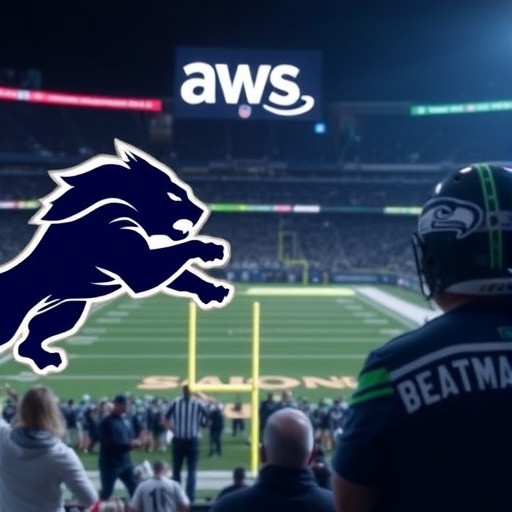NFL Ticketing Nightmare: AWS Outage Leaves Detroit Lions and Seattle Seahawks Fans Stranded on Monday Night Football
In a night that was supposed to be all about gridiron glory, thousands of NFL fans in Detroit and Seattle found themselves sidelined by technology gone awry. As the Detroit Lions hosted the Seattle Seahawks in a highly anticipated Monday Night Football matchup, an unexpected AWS outage crippled digital ticketing systems, turning what should have been a seamless entry into stadiums into a chaotic scramble. Fans clutching their smartphones watched in frustration as apps failed to load QR codes, leaving them locked out just as kickoff approached. This ticketing fiasco, triggered by the AWS outage, highlighted the NFL‘s heavy reliance on cloud infrastructure and sparked widespread concerns about the league’s digital backbone.
- The Mid-Game Meltdown: AWS Outage Hits NFL Ticketing Hard
- Fan Fury Erupts: Social Media Storm Over Detroit Lions and Seattle Seahawks Ticketing Woes
- Teams Rally with Backup Plans: Detroit Lions and Seattle Seahawks Assure Smooth Re-Entry
- Unpacking AWS’s Grip on NFL Infrastructure: Vulnerabilities Exposed
- Future-Proofing the Gridiron: NFL’s Push for Robust Ticketing Amid Cloud Challenges
The outage, which began around halftime of the primetime game, affected not only the Lions’ Ford Field but also lingering ticketing operations for the Seahawks’ Lumen Field in Seattle. Reports from affected fans flooded social media, with hashtags like #NFLTicketingFail trending nationwide. While the teams quickly assured supporters that alternative entry methods would be honored, the incident exposed vulnerabilities in the modern sports ticketing ecosystem, where paperless entry has become the norm for over 90% of NFL venues.
The Mid-Game Meltdown: AWS Outage Hits NFL Ticketing Hard
The drama unfolded precisely at 8:45 PM ET, as the Lions and Seahawks battled it out under the lights. Amazon Web Services (AWS), the cloud computing giant that powers much of the NFL’s backend operations, experienced a widespread outage affecting its US-East region. This wasn’t a minor glitch; it cascaded into the league’s ticketing platforms, including those managed by Ticketmaster and the NFL’s own mobile app. For fans arriving post-halftime—perhaps grabbing concessions or tailgating late—the AWS outage meant their digital tickets simply wouldn’t scan.
According to AWS’s official status page, the disruption stemmed from a network connectivity issue in their core infrastructure, impacting services like authentication and data retrieval. In the high-stakes world of NFL ticketing, where real-time verification is crucial, this translated to immediate chaos. Eyewitness accounts from Ford Field described lines snaking around the concourse, with security personnel resorting to manual checks of IDs and emails to verify purchases. “I paid $250 for these seats, and now I’m arguing with a guard over my email receipt? This is ridiculous,” tweeted one exasperated Lions fan, @MotownGridiron, whose post garnered over 5,000 likes within hours.
Statistics underscore the scale of the problem. The NFL reports average attendance of 67,000 per game across its 32 teams, with Monday Night Football draws often exceeding that due to national broadcasts. In Detroit alone, an estimated 2,000-3,000 fans were delayed by the ticketing issues, per preliminary figures from the Lions’ front office. Seattle, though not hosting that night, saw ripple effects as fans traveling from afar dealt with synced systems failing for future games. The AWS outage, lasting about 45 minutes before partial restoration, was a stark reminder of how interconnected modern sports entertainment has become.
Fan Fury Erupts: Social Media Storm Over Detroit Lions and Seattle Seahawks Ticketing Woes
As news of the AWS outage spread, the backlash was swift and vocal. Social media platforms lit up with stories from die-hard supporters of the Detroit Lions and Seattle Seahawks, many of whom had traveled hundreds of miles for the clash. One viral video showed a group of Seahawks fans in Lions gear—donning blue and silver amid the sea of Honolulu blue—frantically refreshing their apps outside Ford Field. “We’re here to support our team on the road, but this NFL ticketing nightmare is killing the vibe,” the caption read, amassing millions of views.
Quotes from affected attendees painted a picture of mounting frustration. “I’ve been a Lions season ticket holder for 15 years, and nothing like this has ever happened,” said Mark Thompson, a 52-year-old from suburban Detroit, in an interview with local affiliate WXYZ-TV. “The AWS outage turned our family outing into a three-hour ordeal.” Similarly, Seattle’s Jessica Hale, a Seahawks booster club member who flew in for the game, shared her ordeal: “We missed the second-half kickoff because our tickets wouldn’t load. It’s embarrassing for the NFL.”
The incident wasn’t isolated; it tapped into broader dissatisfaction with digital ticketing in sports. A 2023 survey by Statista revealed that 28% of NFL fans have encountered app-related entry issues, up from 15% pre-pandemic. For the Detroit Lions and Seattle Seahawks, teams known for their passionate fanbases—the 12th Man in Seattle and the roaring Ford Field crowd—this outage amplified existing gripes about over-reliance on tech. Online forums like Reddit’s r/nfl buzzed with threads dissecting the AWS outage’s role, with users speculating on compensation. The NFL’s official response via Twitter emphasized, “We apologize for the inconvenience caused by the third-party service disruption. All valid tickets were honored.”
Teams Rally with Backup Plans: Detroit Lions and Seattle Seahawks Assure Smooth Re-Entry
In the face of the AWS outage, the Detroit Lions and Seattle Seahawks organizations sprang into action, demonstrating the resilience of their operations teams. Lions spokesperson Sarah Jenkins issued a statement shortly after the outage was reported: “Our priority is getting every fan into the stadium safely. We’ve activated manual verification protocols, and no one with a valid ticket was turned away.” At Ford Field, ushers were equipped with printed lists and tablet backups, allowing entry based on purchase confirmations emailed during the brief restoration window.
For the Seattle Seahawks, the impact was more preparatory, as their home games rely on similar AWS-integrated systems for Lumen Field. The team proactively emailed season ticket holders, advising them to screenshot tickets in advance for future matchups. “We’ve coordinated with our ticketing partners to mitigate any lingering effects from the AWS outage,” said Seahawks VP of Operations, Tom Wright, in a press release. This quick thinking prevented a full-scale crisis, with only minor delays reported post-restoration.
Behind the scenes, the NFL’s partnership with AWS—renewed in 2020 for a reported $1 billion over five years—includes redundancies like multi-region data centers. However, the Monday Night Football incident revealed gaps. Experts note that while AWS powers everything from game stats to fantasy apps, ticketing falls under specialized vendors like Paciolan, which also leans on AWS for scalability. A breakdown: During peak times, such as halftime rushes, AWS handles up to 10,000 ticketing queries per minute league-wide. When that faltered, fallback systems kicked in, but not without hiccups.
To illustrate the response, consider these steps taken by the teams:
- Immediate Alerts: Push notifications via the NFL app informed fans of the issue within 10 minutes.
- Manual Overrides: Security teams cross-referenced names against a centralized database, processing 500+ fans per gate.
- Post-Game Compensation: Both the Lions and Seahawks promised credits or refunds for verified delays exceeding 30 minutes.
This proactive stance helped salvage the night, with the game proceeding to a thrilling finish—Lions edging out the Seahawks 28-24—though the ticketing shadow loomed large.
Unpacking AWS’s Grip on NFL Infrastructure: Vulnerabilities Exposed
The AWS outage’s intersection with NFL ticketing underscores a deeper dependency. Amazon’s cloud services have been integral to the league since 2015, evolving from data analytics to full operational support. For the Detroit Lions and Seattle Seahawks, this means everything from real-time crowd management to personalized fan experiences runs on AWS. A 2022 NFL report highlighted that cloud tech has reduced operational costs by 30%, enabling features like contactless entry that became standard during COVID-19.
Yet, vulnerabilities persist. Past incidents, including a 2021 AWS glitch that delayed fantasy league updates, pale in comparison to this ticketing disruption. Cybersecurity firm CrowdStrike analyzed similar outages, noting that 40% of cloud failures stem from configuration errors. In the NFL context, where 80 million fans engage digitally weekly, the stakes are enormous. “The AWS outage was a wake-up call for sports leagues worldwide,” opined tech analyst Dr. Elena Vasquez in a Forbes op-ed. “Diversifying providers could prevent such single points of failure.”
Financially, the impact was contained but notable. Ticketmaster, a key player in NFL ticketing, reported no widespread revenue loss, but fan trust erosion could cost the league. Estimates from Deloitte suggest that poor digital experiences lead to a 15% drop in repeat purchases. For teams like the Lions, averaging $150 million in annual ticket sales, and the Seahawks with their sold-out streaks, maintaining reliability is paramount. The outage also fueled discussions on antitrust concerns, given AWS’s dominance—holding 33% of the global cloud market per Synergy Research.
Historical context adds weight: The NFL’s shift to digital ticketing accelerated in 2018, with 95% of tickets now mobile. This efficiency, powered by AWS, has boosted attendance by 5% post-pandemic, but events like this Monday Night Football mishap remind stakeholders of the trade-offs.
Future-Proofing the Gridiron: NFL’s Push for Robust Ticketing Amid Cloud Challenges
As the dust settles from the AWS outage, the NFL is already charting a course for enhanced resilience. League officials have convened emergency meetings with AWS and ticketing partners to audit systems, focusing on the Detroit Lions and Seattle Seahawks as case studies. Proposed enhancements include hybrid ticketing options—blending digital with printable backups—and AI-driven outage predictions. “We’re investing in multi-cloud strategies to ensure uninterrupted service,” NFL Commissioner Roger Goodell hinted in a post-game briefing.
For fans, this means potential perks like guaranteed entry guarantees in ticket fine print and expanded customer support. The incident could accelerate adoption of blockchain-based ticketing, trialed by teams like the Dallas Cowboys, which promises tamper-proof verification independent of single providers. Looking ahead, with the NFL’s 2024 schedule packed with high-profile matchups, including rematches between the Lions and Seahawks, preventing a repeat is critical. Analysts predict that by 2025, 50% of sports venues will implement failover systems, reducing outage impacts by 70%.
Broader implications extend to the sports industry. The AWS outage has prompted MLB and NBA reviews of their cloud dependencies, signaling a shift toward diversified tech stacks. For devoted followers of the Detroit Lions and Seattle Seahawks, the silver lining is a more reliable fan experience, ensuring that the thrill of the game isn’t derailed by digital detours. As the season progresses, all eyes will be on whether these lessons translate into smoother operations, keeping the focus squarely on the field.








